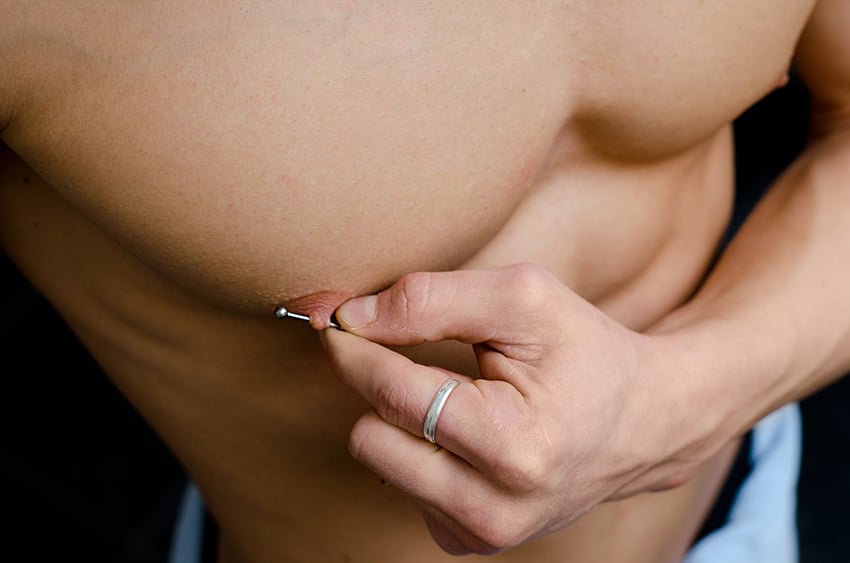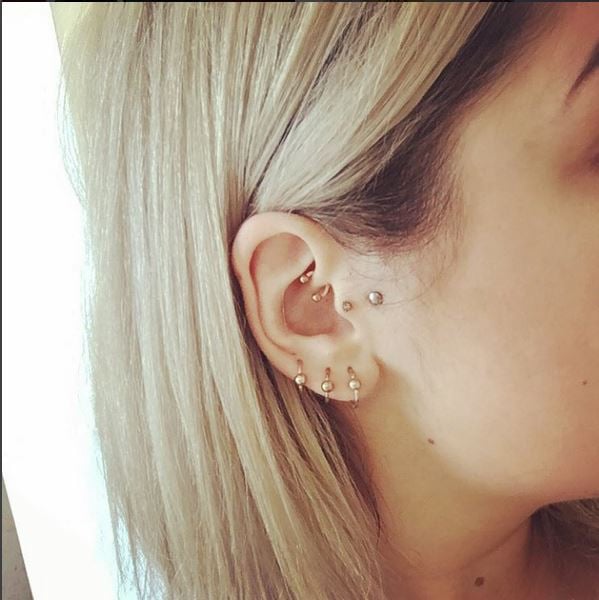By Meghan O'Neal
02/28/2019

I discovered that I was allergic to metal shortly after getting my lobes pierced when I was 12. After wearing my piercing studs for the six week healing period, I was so excited to go out and buy all the new earrings that I could find. With my saved Christmas and birthday money in hand, I skipped over to a popular body jewelry retailer, ready to fill my jewelry box with a new pair of earrings for each day of the week. I spent hours pouring over their selection until I had found the perfect pieces, and when I got home, I immediately donned my favorite pair.
The next day, to my dismay, I awoke to discover that my ears were swollen, red, and had a burning, itchy sensation that would not go away. It was then that my mom explained that metal allergies were fairly common on her side of the family, and it simply meant that I was destined to wear expensive jewelry. To my 12-year-old ears, all I heard was that I could never afford such jewelry on my babysitting salary.
Metal allergies affect roughly 10 – 15% of the population. It comes about due to a disorder of the immune system. When the metallic ions hit your skin, your body sees it as an invading force and attacks. Hooray. Luckily, the symptoms of a metal allergy can be easily avoided most of the time. Here’s what you need to know about your metal allergy and how to purchase jewelry around it.
Metal allergies are medically known as contact dermatitis. Nickel is the most common allergy, which can cause a problem, since nickel is commonly found in cheaper jewelry, belt buckles, watch straps, coins, and other metal objects. (I’m the only one of my friends that I know who has had to throw away a bra because of an adverse reaction to the bra clasps.)
An easy way to find out if you are allergic to nickel is to tape a 5 cent coin to your forearm for 8 hours. If a rash appears after 12 – 48 hours, then you likely have a nickel allergy. Of course, you should visit your doctor for a more definitive diagnosis.
However, a lucky few are allergic to other types of metal (like me), including cobalt, chromium, and surgical steel. These poor souls must avoid prolonged contact with any cheap metal and remain vigilant when making jewelry purchases.
Most of the time, metal allergies manifest as uncomfortable skin reactions. A rash, dry skin, or itchy, blotchy skin will appear where the skin as had prolonged contact with metal. These symptoms are usually just a minor inconvenience and will go away once you’ve taken off the piece of metal causing the reaction. However, as with any wound on the skin, it can get infected, so be sure to take care of the rash and keep an eye on it as it heals. Very rarely, people have more intense reactions including blistering on the skin. If this happens, see your doctor immediately for treatment and to talk about your options.
https://www.instagram.com/p/BqebqwaA2kO/
Even in minor cases, a doctor may prescribe creams, antihistamines, or steroid shots to help lessen the reaction, but avoiding cheap metals is usually the simplest solution for a metal allergy.
The best way to avoid a breakout is to avoid metals that cause a reaction. If you’re only allergic to nickel, there are many inexpensive nickel-free jewelry options. Opting for these will negate the allergy issue all together. If you’re one of the lucky few who are allergic to any cheap metal, then you’ll want to opt for high-quality metals, such as 14k gold and platinum.

Be wary when you shop for white gold. Some white gold may contain nickel in order to get its color. (Good news: all FreshTrends‘ white gold is nickel-free!) Be diligent, and research the metals in your white gold jewelry before you invest. Other golds less than 14k may also contain metals that will cause a reaction, so be sure that you’re buying high-quality pieces. Platinum is a great alternative to white gold if you want the silver color with no risk of reaction.
As for nickel-laden metals found on belt buckles, wrist watches, and other wearable items, simply coating the metal in clear nail polish can often act as a great buffer between your skin and the metal. You’ll need to reapply the polish every few weeks, but I’ve found that it is an effective way to protect my skin. It’ll also help keep your skin from turning blue from the cheap metals.
Nail polish is not a great option for piercing jewelry, however, because the chemicals in the nail polish may cause a different reaction. Instead, you can find plastic covers to put over the post to protect the skin against the metal.
The best option is to stick with fine metals that won’t cause a reaction. As I like to say, “My body simply has great taste.”
 Copy her look: 14k Gold Captive Ring, 14k Gold Round Cartilage Stud, 14k Gold Curved Barbell[/caption]
Copy her look: 14k Gold Captive Ring, 14k Gold Round Cartilage Stud, 14k Gold Curved Barbell[/caption]
Metal allergies are inconvenient, but just because you have a metal allergy doesn’t mean that you can’t enjoy body piercings and adorable jewelry. If you opt for gold, there’s no reason why you can’t rock that septum piercing you’ve always wanted (but talk to your doctor first to alleviate any concerns). As always, if your allergy is more extreme than an irritation, talk to your doctor about it. Otherwise, avoid cheap metals, and shop FreshTrends‘ handmade 14k gold jewelry.
Leave A Comment